6.1 - Scrutinizing "Hope" and Popular Strategies and Goals
Two possibilities arise from this newfound sense of vulnerability. It can be a humbling moment in which, brought down to earth, we are able to hear at last what those on the receiving end of Western projects of colonisation, salvation, modernisation and development have been trying to tell us for generations. Or it can be the licence for the grandest version of that project yet: an attempt to turn our planetary home and all those we share it with, our human kin and our more-than-human kith, into an object of global management and control, and all in the name of 'saving the world'.
-Dougald Hine, “At Work In The Ruins”
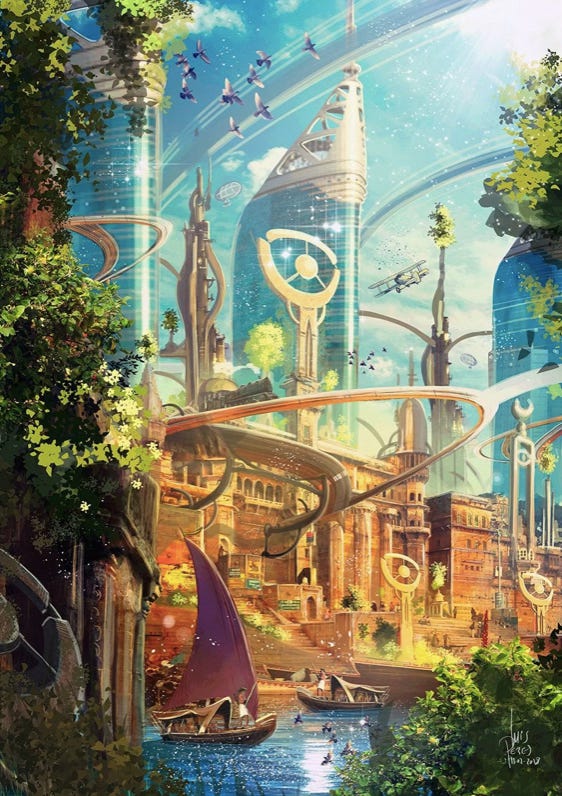
Bargaining for the Impossible
I’ve thought a lot about what hope even means. One way that people use the word is to express a preference when there’s a genuine degree of uncertainty. I don’t know that countries will engage in nuclear war. There are too many factors. I know that they could, but I hope that they don’t.
But the hope that I’m seeing more frequently rests on a lack of education in or contemplation of ecology, biology, physics, psychology, sociology, anthropology -everything I’ve documented here, all the knowledge we’ve worked hard to accumulate. It’s an excuse to remain parked in the early stages of grief (denial, bargaining, anger) and not face reality. They abandon a commitment to objective inquiry, bypass understanding, deactivate skepticism and embrace whichever messages convey a better-than-bleak century. In Overshoot, Catton calls this “eager self-deception”.
“The world is now dominated by an animal that doesn’t think it’s an animal. And the future is being imagined by an animal that doesn’t want to be an animal.”
-Melanie Challenger
We want the scary weather to go away and we want electricity, running water, government, and our current expansive claim on the Earth’s calories. We want to have our Earth and “develop” it too (or keep it developed). We like nature enough to put a landscape as our desktop wallpaper, but we don’t want to be too subject to its caprices and perils, as all other organisms are. We like a challenge, but we aren’t okay with an insurmountable one. We insist on our entitlement to a do-over, even this late in the game, and that the resolution be palatable to Homo colossus. We cling to the vision of a Green Transition, telling ourselves that Civilization can be environmentally benign. Bendell suggests that our belief in the possibility of sufficiently reformed institutions (as opposed to the impossibility of sufficiently reforming institutions - Vanessa Machado de Oliveira’s “beyond-reform” lens) (and how could one argue against this when it’s presented as “‘being positive’, ‘having hope’, and ‘believing in humanity’”?) serves as "psycho-social justification for calm obedience to current economic and political order" and “deference to a sociopathic and ecocidal culture”.
“What I’m doing is just pointing to existing trends and extrapolating. That’s all. There’s no magical speculation. But because we’re in a culture that assumes human dominion, human progress... the burden of proof is on someone like me, or I’m the one who’s being a bit odd and pessimistic. No, they’re just being wackos. But we live in a wacko culture that assumes that technology is supreme and humans are supreme”
– Jem Bendell, interviewed on the Liminal News Podcast
The Ecomodernist techno-(pseudo-)solution platform might be fairly familiar, exemplified by the The Breakthrough Institute and Alliance for Science. Meanwhile, I coined the term Franken-vironmentalism for a variety of Civili-zealots who are rarely subject to criticism for misunderstanding Civilization’s (inevitable) relationship with its environment. Their persona tends to be more “earthy, outdoorsy Nature-Lover”. They emphasize the need for culture change and even the abandonment of economic growth. Their despair and anxiety are authentic. However, because they lack a full understanding of our predicament, they expect to see Civilization persist, and they don’t see that their dual goals (preserving Civilization and saving the planet) conflict.
Reductivist Descriptions: Villains, Heroes, and Precision-Dismantlement
It seems that many Civili-zealots aren’t holding all three of the following to be true at once:
PREMISE #1: To continue burning fossil-hydrocarbons would be catastrophic (for the planet, and therefore for Civilization).
This is the one they’re clearest on. But they’re willing to make an exception, given their blindspot for Premise #3: Whatever amount of emissions (and injustices against Civilization-independent communities and other species) are required to produce and maintain “clean” equipment gets a free pass.
PREMISE #2: To end burning fossil-hydrocarbons would be catastrophic (for Civilization)
They reject any statements of fossil-hydrocarbons’ value to us. One Guardian article’s title reads, “Campaign pushes idea oil is ‘vital’ to global security” which seems to imply that there’s no truth to that statement (otherwise the headline would read something like “Campaign emphasizes oil’s vitalness to industrial civilization”).
PREMISE #3: To pursue “clean” energy generation would be catastrophic (for the planet, and therefore “indirectly” for Civilization, as I explain in Post 2.2 … AND also directly for Civilization, as I explain in Post 2.1)
Further destroying our one planet in the name of human-serving technology doesn't count, as long as the final product doesn't have a tailpipe. Proponents of “clean” energy pave the way for new greenwashing - e.g. Exxon is launching a lithium empire, and BP and Shell are getting into agrivoltaics. As a reviewer of the Bright Green Lies documentary summarizes, “Mainstream environmentalism … is its own worst enemy.”
Some common rhetoric for downplaying habitat destruction includes “Perfect is the enemy of the good!” or “You’ve got to break a few eggs to make an omelet!”. The person might also point out that, for example, wind turbines kill fewer birds than cats do (e.g. 100 versus 200). Although it’s true that 100 < 200, the aim is to avoid killing any additional birds, so we should be concerned that 200 + 100 > 200.
They perceive warnings about “clean” energy’s flaws as praise for fossil-hydrocarbons, or they dismiss its repercussions. Sammy Roth, LA Times climate columnist, titled a piece “Solving climate change will have side effects. Get over it”):
“I’m familiar with the science showing that human survival depends in part on limiting further biodiversity loss and protecting much of the remaining natural world… But we don’t live in an ideal universe”
Alexis Shotwell writes about the difference between a conspiracy theorist and an activist:
“the conspiracy theorist holds that the best defense is more and better knowledge (read my website, listen to my explanation, investigate what you know) and the activist holds that the best defense is creating another world.”
However, what conspiracy theorists and activists have in common (and what they and Shotwell take for granted) is much more significant. They base their strategies on the same simplifying (and inaccurate) assumption: that there is an isolated set of bad guys. The villain varies: fossil fuel companies, greedy CEOs, frivolous celebrities, capitalism, Republicans who defund the Environmental Protection Agency, the Global North, conventional agricultural methods, meat-eaters, consumerism and fast fashion, flying, plastics and forever chemicals.
These do harm the environment. But even if we were to rid ourselves of them, as long as Civilization operates, it will continue to do damage - as it has dozens of times, before any of those enemies emerged. It’s scary to realize that a hijacker is driving your bus toward a cliff; it’s even scarier to realize that the bus has no driver (every participant in the economic, at every level, is helping to pedal it) and no steering wheel, and has already careened off the cliff, with only a matter of time before gravity overtakes its forward inertia.
I suspect that at least some promoters of the nuance-free vision have become aware of its shortcomings. Some possible reasons for why they continue to defend it include:
They’ve been touting it for so long that it would be awkward for them to pull an about-face now.
If they lie about this one thing, they can get the (legitimate) rest of their message out about the need to relocalize, adopt regenerative farming practices, etc.
They figure that we have a few decades before fossil fuels are completely inaccessible AND all “clean” equipment peters out, so a fully post-industrial future isn’t something that many of their readers (many of whom are age 50+) really need to worry about
They want to prevent widespread panic for as long as possible, stringing the public along from one pacifying myth to the next.
They realize that governments will rollout “clean” infrastructure and products anyway, and if you can convince yourself that you’re on-board with the plan, then you don’t have to face the dread of knowing that the superorganism is hellbent on destroying its host.
Dubious Prescription: Precision Dismantlement
People like to think that they can make a surgical micro-incision and remove only the elements that they dislike about the civilization, without affecting anything else. In fact, it would go more like this:
Astrophysicist Tom Murphy puts it more seriously in his Metastatic Modernity episode #10, “Ditch the Bad?”:
One manifestation of the “precision dismantlement” fantasy is the degrowth “by design, not disaster” vision. If governments attempted to unravel and shrink our economies, they would do so with less-than-perfect competence and citizens would likely revolt.
Magic supposes outcomes need not depend upon clear and adequate (and ascertainable) causal actions. Otherwise put, belief in magic imputes causal sufficiency to acts or processes that are in fact not sufficient to cause the particular outcome."
– “Bottleneck: Humanity’s Impending Impasse” by William Catton
The other form is sabotage, as depicted in Kim Stanley Robinson’s “Ministry for the Future” cli-fi novel (where the “Children of Kali” crash jets and infect meat with prions) and in the movie adaptation of Andreas Malm’s “How to Blow Up a Pipeline”. Ultimately, eco-sabotage fiction might just indulge people’s desires to feel like radicals while obeying society’s rules. They can use the dream to suppress their anxiety, without ever putting their own lives on the line to make it happen.
There might be a role for sabotage, but it’s best that the motivation/intention align with the likely outcomes. Consider these snags:
Blocking a pipeline doesn’t stop fossil fuels from flowing. The company will transport them by truck or train, which makes spills more likely.
Government will side with companies and crack down with oppressive laws.
The portion of society that finds eco-terrorism unwarranted will resent the perpetrators and become more fiercely loyal to their tribe.
An opposing contingent could likewise use coerce tactics to get what they want.

Dubious Prescription: Appeals to Empire-Emergent Institutions
Activists often focus on governments, corporations, universities and other entities that arise from civilization. Their reasons for choosing this approach might include:
If anyone is capable of “doing something about” our global-scale predicament, it would be the institutions that are “in-charge”. Jem Bendell points out: “Many environmentalists now are so understandably freaked out by how bad the environment is and how ineffectual their efforts have been that they are becoming authoritarian. They're saying, ‘Oh well we just have to force everyone to change.’”
Bendell observes an unprecedented "'managerialist' deference to hierarchy and supervision.” People don’t want to eliminate institutions that orchestrate activity in our world, so they can aspire only to reform them.
It’s tradition. Why question a classic? (But what the biosphere would need to recover is for a dramatic reduction of resource extraction, to a level comparable to what other species extract, i.e. relatively modest calorie consumption and little more. Previous tricks to success, like the “3.5% rule” that “no government has withstood a challenge of 3.5% of their population mobilized against it during a peak event” don’t apply.)
Institutions can only promote an order that supports their existence and a compatible vision, even if that order and vision have no future. They can acknowledge our worsening crises, but they can’t admit (or even perceive) that civilization is the reason for this; that as long as civilization persists the environment will undergo further devastation; and that resource depletion means “progress” and “normal” won’t be possible much longer, anyway. It’s extremely unlikely that we’d ever see a government (especially of a major world power) that:
Is willing to impose radical consumption reductions, yet …
can get elected and …
doesn’t get overthrown, and …
without being/becoming despotic …
is capable of enforcing such measures widely, even as fuel and electricity become scarce (These institutions -along with codified rights, policies and programs- emerged and persist only with the support of excess energy slaves and will not endure without them.)
Bendell states in an interview -Part 1 and Part 2- people are quick to assume that an eco-authoritarian government will protect their in-group/demographic. He explains further: "The one thing worse than the world's elites not taking climate change seriously would be them taking climate change seriously." (See: The American government’s actions in 2025.) An analysis finds that “discourses of emergency and crisis serve as tools through which the coercive and controlling powers of the state are sustained, maintained, and legitimized … declarations of emergency are not only ineffective tools in the pursuit of climate justice, but may be actively dangerous.”
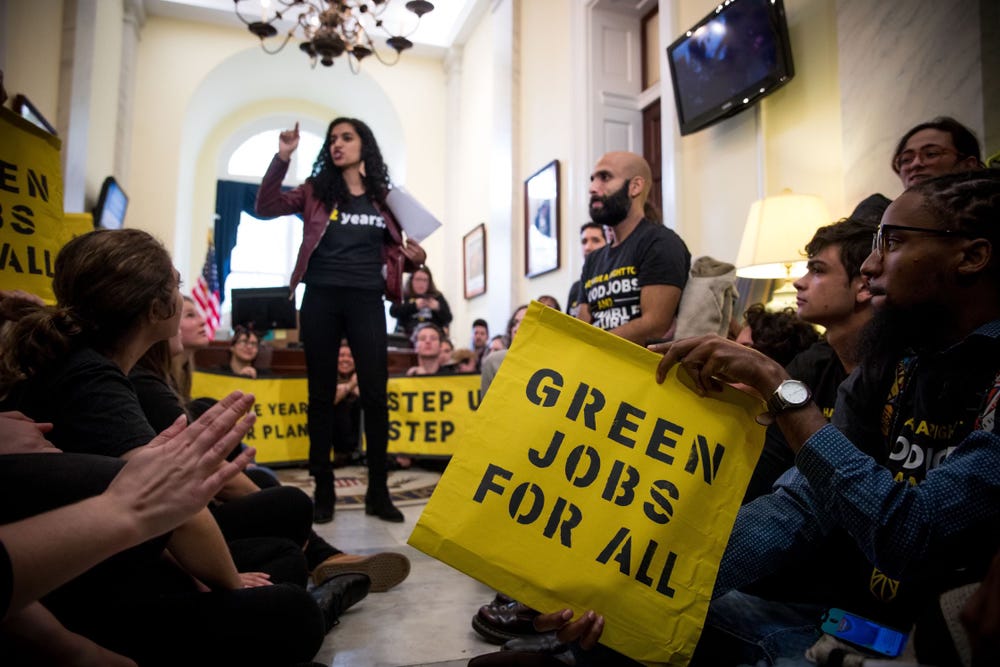
Consequentialist Ethics & Anti-Doomerism: Censorship as Behavior Control
Panicked citizens, rather than seek to understand our predicament, reach for the readily available scripts:
What we want: an Energy Transition (or other non-solutions), implemented by governments, corporations, universities and other modern institutions
How well get it: marches, protests, voting, etc
Standard activism turns out to be more about reflex, catharsis and identity-affirmation than rational assessment.
Yet many express certainty that mobilizing people in marches for “climate action now” is a wise strategy. And interpretations of ecological data that potentially discourage people from the narrow range of approved behaviors makes them … inaccurate?
For example, one article reports that the link between anger and climate protest is seven times stronger than it is between hope and protest. A Yale social scientist and Extinction Rebellion activist is quoted: “People should feel angry because they had been deliberately deceived by fossil-energy companies and governments had let that happen.”
Meanwhile, this study takes issue with the following pieces of journalism -
A New York Times Op Ed: “To stop emitting waste carbon completely within the next five or 10 years, we would need to radically reorient almost all human economic and social production, a task that's scarcely imaginable, much less feasible”
From the New Yorker’s Opinion section: “The climate apocalypse is coming. To prepare for it, we need to admit that we can't prevent it”
The study’s authors posit that these blurbs would leave people shocked, paralyzed and resigned, and that this makes them (despicable) “discourses of delay”- whether or not the statements are true doesn’t seem to concern the authors. I’ve noticed rising interest in using psychology and sociology to essentially mobilize the masses (popular speakers on this include UCSD’s Adam Aron and American University’s Dana Fisher) to demand the same “right” thing that will supposedly save us.

Dubious Prescription: Mass Awakening
Some [want to] believe that our population of 8+ billion humans can embrace a single set of beliefs and behaviors to save the planet (without relinquishing civilization, of course). This is more common with people who sees themselves as more progressive and/or spiritual, than with the business/finance/engineering crowd. It helps to use abstract language like Findhorn’s “Great Turning” website. In reality, such a phenomenon would be impossible with even the lowest bar (e.g. going vegetarian), let alone with the behavioral and mental shift that our actual ecological fate would require of people.
Dubious Prescription: Selective Engagement with Indigenous Wisdom
"What Mother Culture teaches is that the past is dreck, is something to be hurried away from... ancient customs are nice for institutions, ceremonies, and holidays, but Takers don't want to adopt them for everyday living."
-”Ishmael” by Daniel Quinn
“We are fighting not to have roads or electricity. This vision of self-destruction that’s called development is what we’re trying to avoid.”
– a representative of a community that lives indigenously in Colombia
Even the (ostensibly) most environmentally-minded people often reject the notion that a sustainable lifestyle must be too “primitive”. They are so attached to civilization that they explicitly deny the imperative to re-indigenize:
Degrowth scholar Kohei Sato recently insisted, “I’m not against technology. We need renewable energy... I’m not an advocate of ‘going back to nature’.
When the COP28 president said, “Show me a roadmap for a phase-out of fossil fuels that will allow for sustainable socio-economic development, unless you want to take the world back into caves”, there was an outcry against the notion that life without fossil fuels would be less comfortable. Al Jaber called “clean” energy advocates’ bluff and they didn’t even realize it.
"The common institutional desire is for the formula: business as usual, plus nonthreatening Indigenous content, minus guilt and risk of bad press." - Vanessa Machado de Oliveria, “Hospicing Modernity”
Nevertheless, Franken-vironmentalists have caught onto the fact that indigenous communities offer some kind of value, so they find ways to check a box without upending their worldview. They don’t want to be told how to forage like their lives will depend on it or be advised to cap their birthrate at what the local food web can support. Instead:
Metaphors are conveniently open to interpretation. Part of the appeal of The Eagle and Condor Prophecy is that it can feel inspirational. A Homo colossus audience can assume that Nature’s restoration of balance doesn’t imply anything ominous for their own families.
Likewise, Robin Wall Kimmerer’s term "honorable harvest" doesn’t sound as jarring as the underlying message: The industrial food system is in Wrong Relationship with Earth and will not continue to exist, and many of us won’t survive without its support. When the rubber band snaps back and everyone’s local carrying capacity once again applies, Nature will reimpose a Right Relationship budget on us.
Lyla June’s TEDx Talk on indigenous agroecological approaches is a stretch: “You might say, ‘Oh, that’s very nice, Lyla, but that could never scale. That could never feed today's massive global population.’ And to that I say, contrary to popular belief, these continents were actually densely populated by Indigenous people, as more and more studies are proving, and their food systems still supported them. I would venture to say that these systems are even more efficient than industrial food systems because they protect and augment the very things that give us life instead of extracting and destroying them.” Okay, but-
North America wasn’t as densely populated then as it is today.
The earlier inhabitants didn’t claim huge territories as exclusively theirs as a food source and prevent other species from eating “their” calories.
They weren’t dealing with an increasingly destabilized climate and soil that had been depleted by decades of industrial farming methods.
What percentage of the population would need to be involved in this effort? I don’t think the cheering audience understands that this would require them to abandon whichever efforts they’re currently attached to.
See Shaun Chamberlin’s “The Secret Truth Behind Environmentalists’ Favorite Argument”.
Dean Spade’s article, “Climate Disaster Is Here - and the State Will Never Save Us”
“Post-environmentalism: origins and evolution of a strange idea” by Giorgos Kallis and Sam Bliss
An episode of Post-Carbon Institute’s “Crazy Town” podcast: “Delusion to the Left, Denial to the Right”
Rex Weyler, co-founder of Greenpeace, interviewed by Nate Hagens about “Crisis in the Ecology Movement”
A blog post about two recent cli-fi novels (Ministry for the Future and The Overstory) that feature sabotage
“Can a New Genre of Eco-Thrillers Inspire Climate Action”, about pop culture’s favorable framing of eco-terrorism


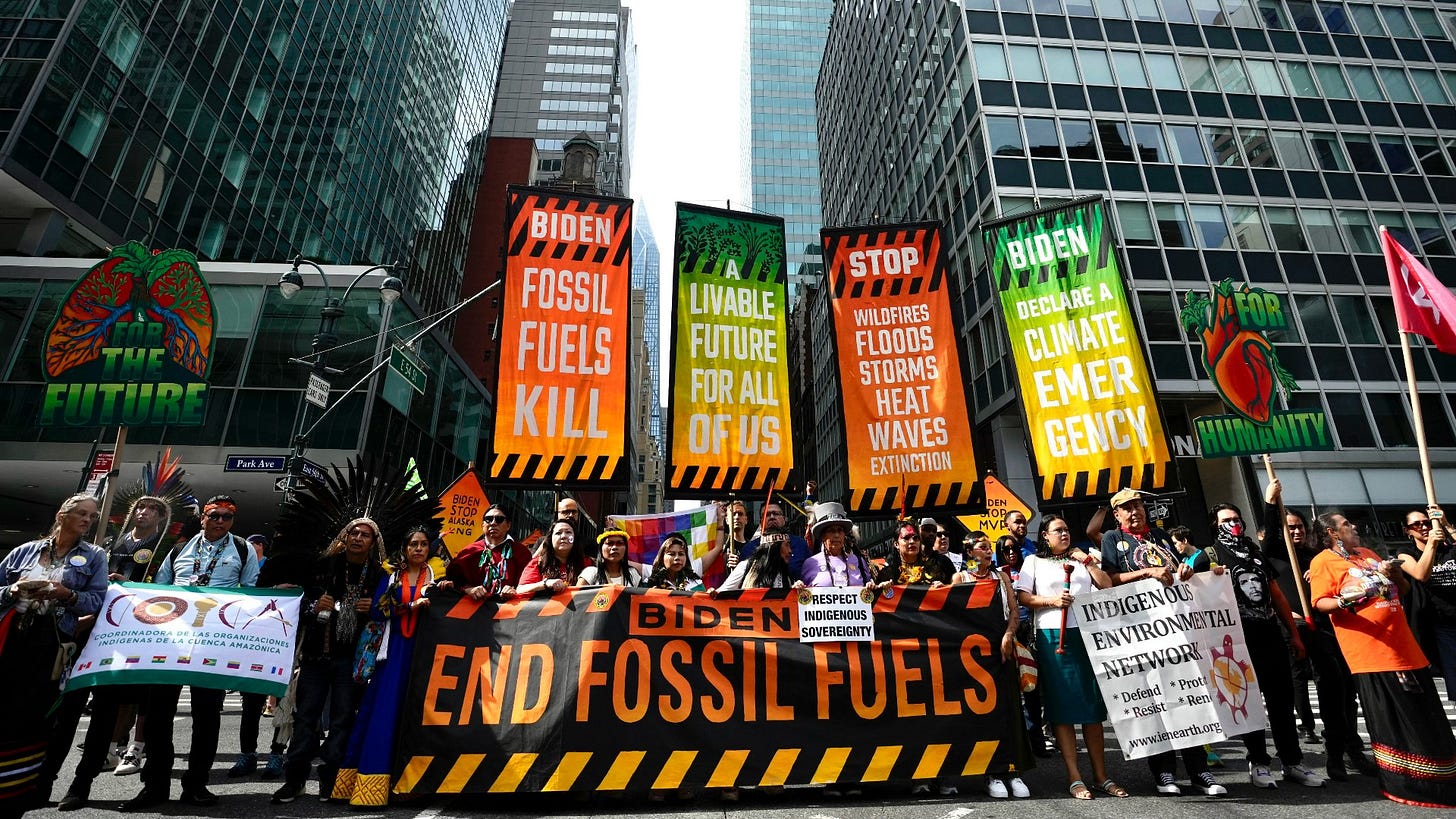
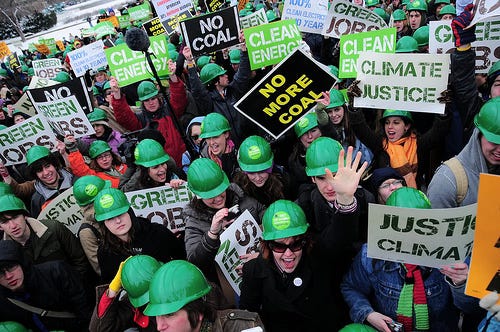
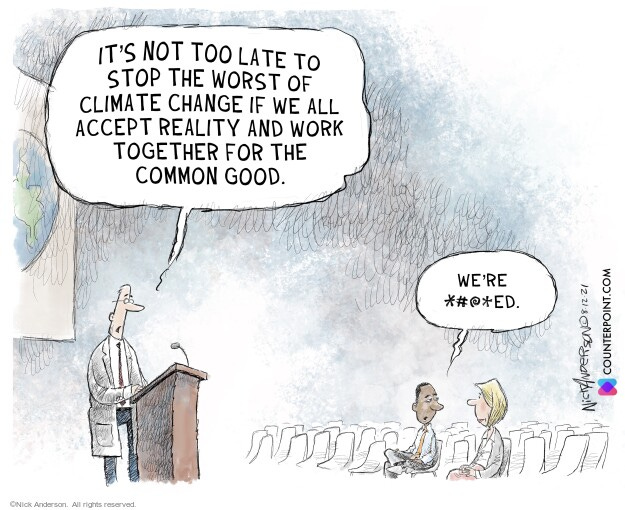


This was excellent. I’ve been on and off working through a Sustainability degree, and I’ve recently opened my eyes to the fact that it’s basically pointless. This said many things that I thing, so much more eloquently. Thank you.
Dismantling dualisms - Beyond reform, or revolution, there is reality: Physics demonstrates that it it isn't possible to reform what is inherently unsustainable, but all the same, the attempt to 'make the unsustainable sustainable again' remains the preoccupation of 90%+ of environmentalists, because this naturally aligns with their proclivities, and interests.
Likewise, it isn't politically possible to effect a revolution when the immediate interests of the vast majority are tied (caloric intake) to the system they imagine dismantling. The unsustainable system of ecocidal and exploitative, human-supremacism, is what feeds most of 8+ billion people. Furthermore, the system is dismantling itself much more effectively due to its own inherent contradictions, than any enlightened eco-socialist revolution could ever hope for. Billions will die in its wake - and that's not a revolution many will voluntarily sign-up for.
Beyond reform or revolution, whilst there are no solutions, there are better and worse responses to our predicament. Now, in the present, useful responses can be had which acknowledge the ongoing legacies of the past and how they inform the structural violence and trauma of the present to create more socio-ecological justice right now, and into the immediate future, but importantly, without prefiguring fantastic imaginaries of post-collapse ecotopias where 'pure' and 'natural' humans roam wild and free. These imaginaries do real violence as they lazily skip over the various injustices and sufferings of the present, imagining these experiences merely as 'compost' for a deep green future that will never be.
Fundamental ecosystems, and the biodiversity which once supported paleolithic and neolithic existences, no longer exists, nor the rich alluvial soils, now poisoned with chemicals and infested with microplastics. The rate of climate change and species-loss show us that The Sixth Mass-Extinction is proceeding at a much more furious rate (100-1000x faster) than even that of 'The Great Dying' - the Permian-Triassic extinction, aka - The Big One.
Indeed, some may argue that humans are already 'functionally-extinct' but most certainly, hard evidence demonstrates that homo-sapiens are rapidly losing the ability to reproduce (along with other species like pollinators) and will definitely, saving some kind of miracle, become functionally extinct well before 2050. And this is assuming humans can make it that far! As the process of collapse accelerates, the complex network of globally interconnected and interacting systems loses integrity with significant socio-political, and geo-political implications, further raising the likelihood of nuclear conflict, and nuclear winter.
Recognising that socio-ecological justice is inherently desirable, we can all take action as individuals and communities for whatever partial and relative justice can be attained as the process continues to inevitably accelerate towards our doom. Reworking the title of Olivera's "Hospicing Modernity", it isn't 'modernity' that requires hospice, rather, it is life, as we know it, which deserves palliative care, for a JustCollapse.